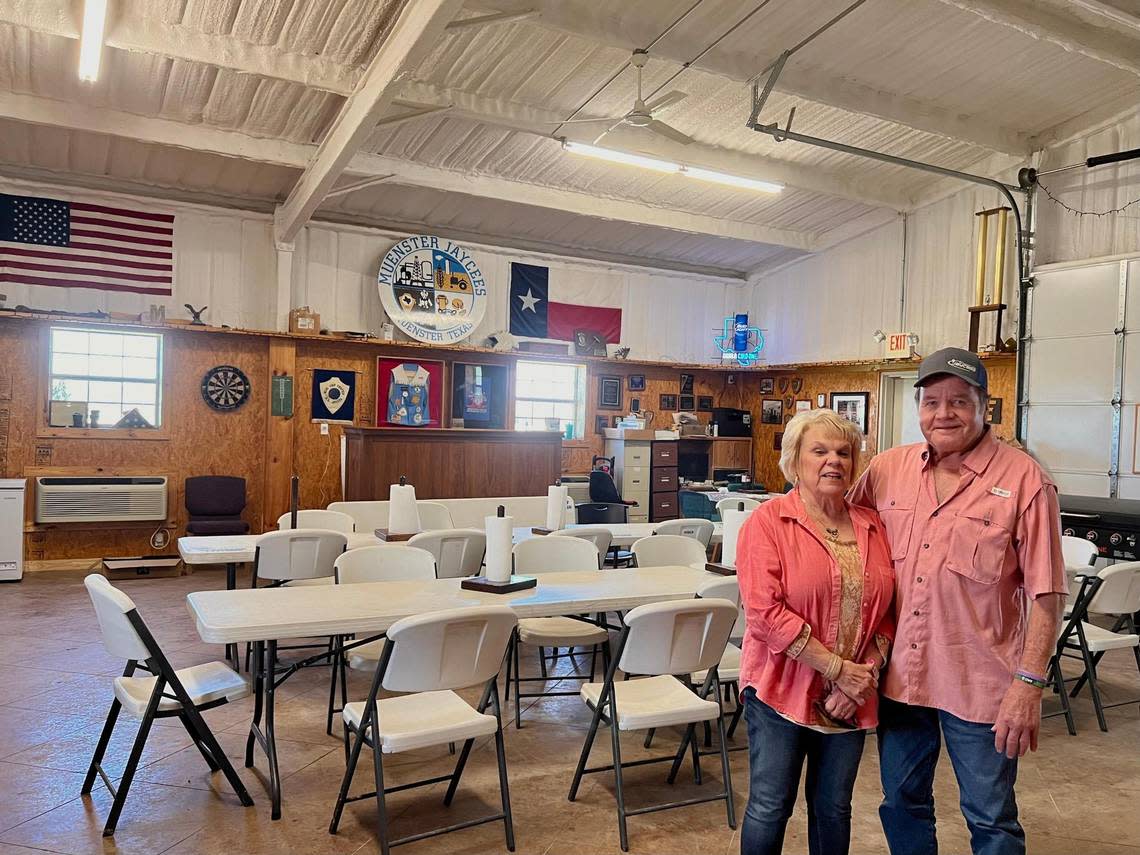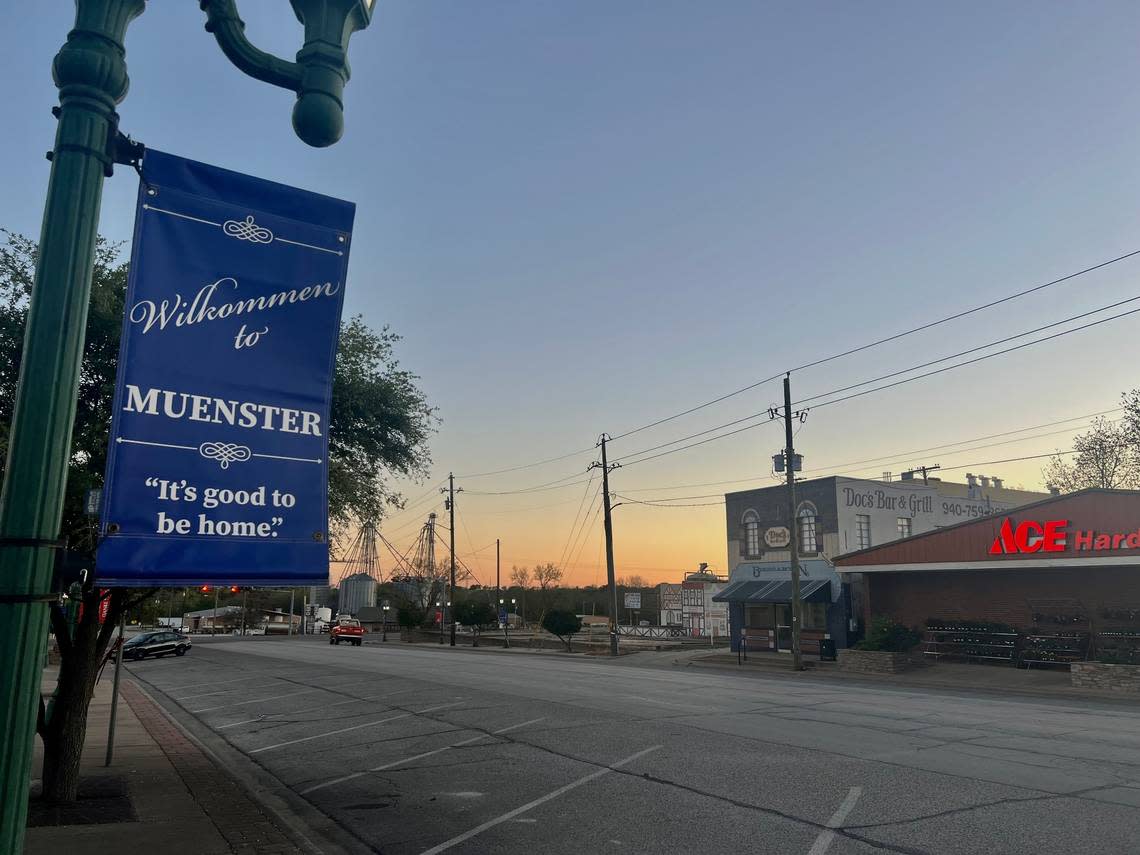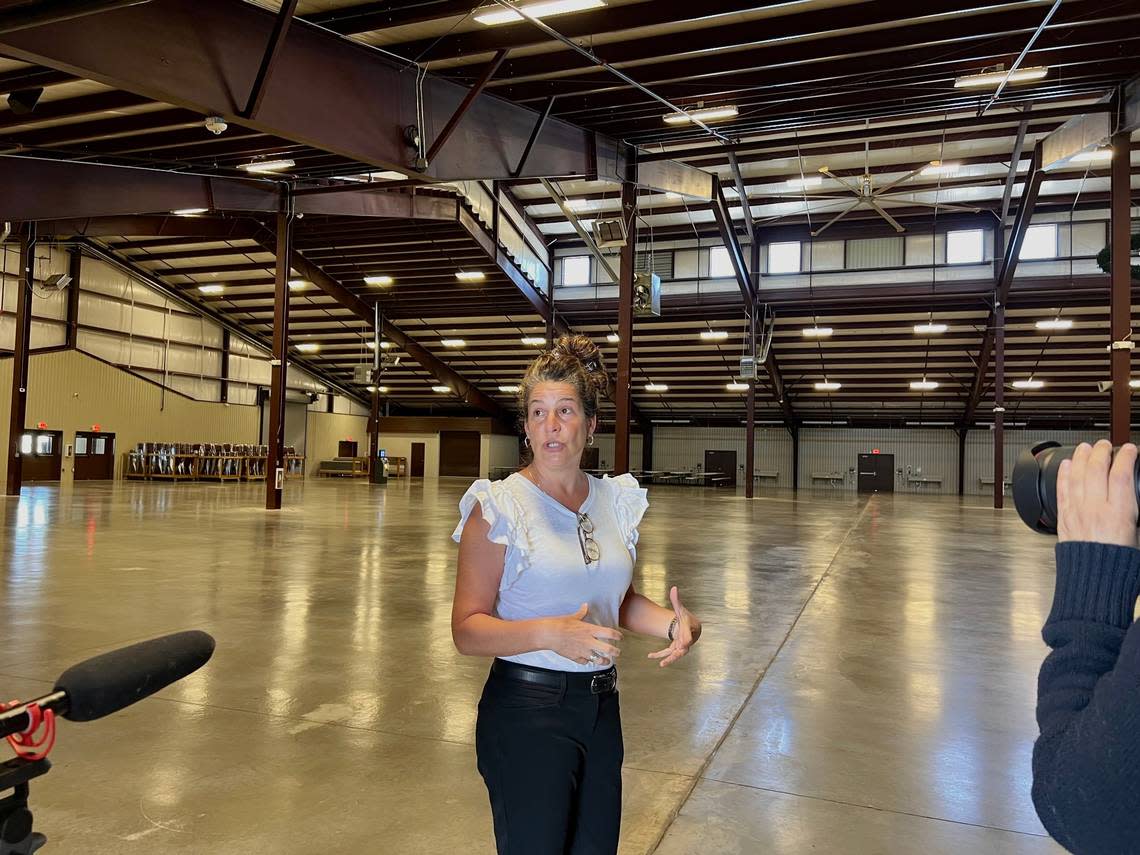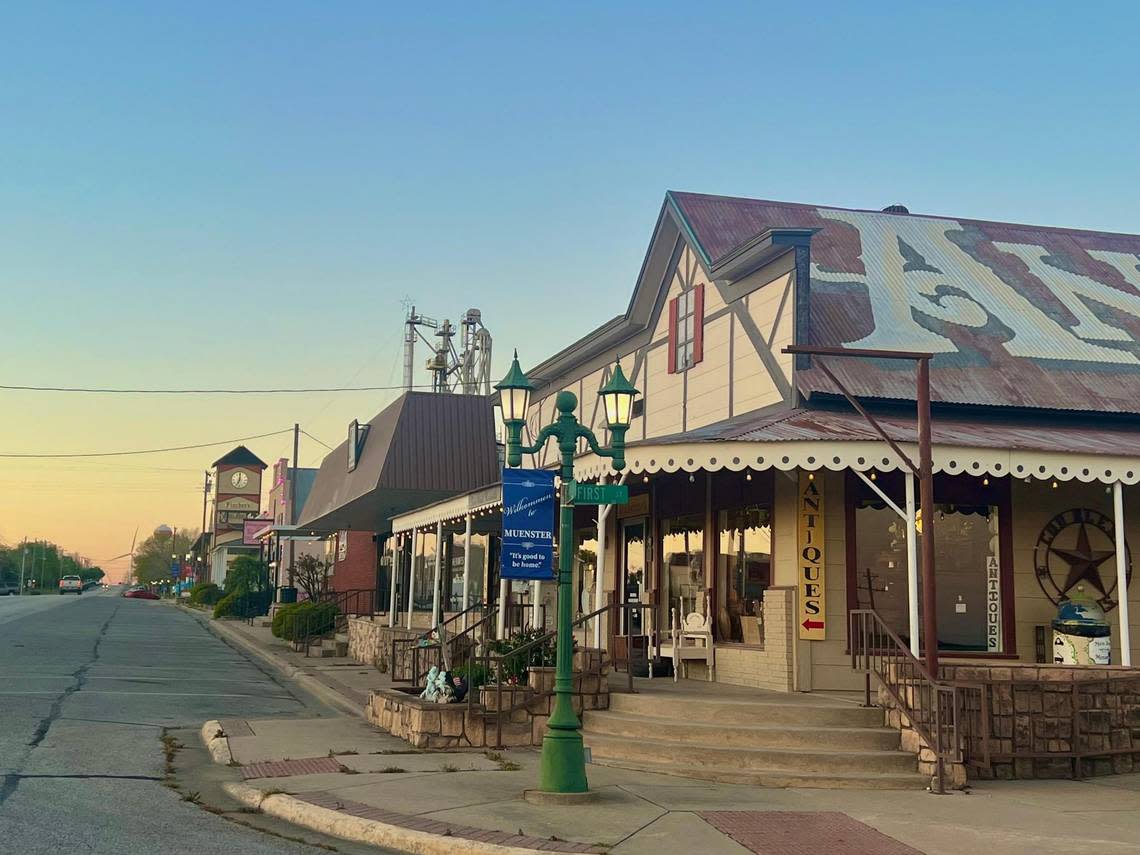Inside the dispute nobody in Muenster wanted: Competing German festivals
Every spring tens of thousands of people flock to this North Texas city of 1,600 with a notable German heritage and a festival to go along with it.
Muenster’s downtown features buildings with traditional cottage-style German architecture in contrast with a pair of shiny feed mills. Older homes sit just yards from the city’s center. On the edges, new developments are popping up on former farmland.
Muenster is one of 12 cities in Cooke County (whose population of 43,050 is even smaller than the Fort Worth suburb of Keller).
North of the city, pumpjacks churn, wind turbines spin and cattle wander in tandem. Sprinkled for miles and miles along U.S. 82 and Interstate 35, billboards invite visitors to Muenster for Germanfest, scheduled for Friday through Sunday.
But this spring the city’s biggest yearly event has brought new controversy, attention and even some division with its two largest nonprofits at odds.
A new festival, born out of a contract dispute, will take place a half mile down the road from Germanfest at Muenster City Park, where the festival was held from 1978 to 2018.
The dispute started over beer.
The trailer and the contract
In February, the Muenster Chamber of Commerce, which has put on the event since 1975, asked the Muenster Jaycees to take a smaller chunk of beer sales.
The philanthropy group has helped with the festival since the late 1970s, always providing beer from a van filled with kegs.
According to Wayne Klement, a senator for the Jaycees, the chamber initially wanted a 50-50 split on beer sales, even though the Jaycees buy roughly 200 kegs and provide labor.
“We bought the beer, we bought the CO 2 for the pumps, we bought the diesel, we paid the bartenders and supplied cups, supplied all the labor to serve the beer and to sell the tickets,” Klement said. “Well, we threw that out the window right off the bat. So, our representatives and their representatives started having meetings.”
The Jaycees applied for a permit with the city to sell alcohol in the park “just in case,” Klement said.
“Just in case” happened.
“We offered to set the whole thing up. All the tables and chairs, help decorate, and put it all back when it’s done,” Klement said. “We were going to do that extra. At the final meeting they said it’s just not going to work.”
Klement and the chamber have said that the final offer was a 70-30 split on beer sales but they couldn’t come to an agreement on labor.
“They were not going to pay us anything for selling all the tickets, and that’s where all the labor was,” Klement said.
Lilly Palmer, who heads the Muenster Chamber of Commerce, said that rising costs were the reason they tried to renegotiate.
”Over the last several years, we’ve seen significant increases in expenses to host these events, for example security, entertainment, tent rental supplies,” Palmer said.
In response, Klement said costs are higher for everyone.
As contract talks soured some organizations hitched their wagon to the Jaycees’ festival.
The Boy Scouts, the Muenster Knights of Columbus (who provide margaritas) and the Fleitman family, which runs a booth for “nagelschlän” (an ancient German game), all opted to follow the Jaycees to Party in the Park.
Germanfest took place at the park for 40 years before moving indoors in 2018.
There is also the annual Germanfest bike rally, which is separate from the festival but occurs on the same weekend. It lists its after party at the city park instead of at Germanfest.
When asked why he thinks local vendors have followed, Klement is quick to respond.
“Because of the $165,000 donated back to the city,” he said. “They know how much we put back and how much we do.”
The Jaycees’ good deeds
The Jaycees first formed in St. Louis in 1915 as a way for people 18 to 40 to participate in civic and community service. Notable alumni include Larry Bird, former President Ronald Reagan, Elvis Presley and Bill Gates.
But across the United States its popularity has faded.
Texas has 16 remaining Jaycee chapters, three in German-Texas cities (the others in New Braunfels and Fredericksburg).
“People don’t really volunteer like they used to,” Klement said.
But Muenster’s Jaycees chapter is an anomaly.
It’s nearly impossible to travel through Muenster and not see the Jaycees’ impact on the community.
Klement, 74, has been around since the chapter began in 1963. As he drives around the Muenster City Park in his burgundy Ford F150, he points to a small pavilion that says “Keep Muenster Beautiful” on the door.

Klement reminisces about building the pavilion in the late 1970s and how the Jaycees revamped the city park in 1968.
“It was nothing but brush,” Klement said. “But the Jaycees cleaned it all out.”
On Main Street, the Jaycees helped fund a volunteer fire department. Many of the firefighters are also Jaycees.
Klement’s wife, Tudor, said their response times rival those of paid firefighters.
The Jaycees have built ballparks and they let for kids from Muenster play sports for free there.
But their role in the community goes further than buildings and ballfields.
“If somebody gets cancer or something, immediately, they’ll get help from us,” Wayne Klement said.

Several times, the group raised $100,000 to pay someone’s medical bills, Tudor Klement said
Jared Flusche is the Jaycees president. His family was among the first to settle the city.
Their presence is still felt in the city. Flusche Enterprises, a pipe and steel welding machine shop, is just an intersection past downtown on Main Street.
Flusche took a break from work recently to talk to the Star-Telegram in the Jaycees meeting room.
Aside from the folding tables, the rest of the meeting room rings like a man cave: white lights strung along wood paneling adorned by neon beer signs. An aged cream, green and orange floral couch sits near a dart board and pool table, all just a few yards from where the beer van is parked outside.
“I love the fact that when I drive down the street, I see people I know and I wave to them, they wave back,” he said. “Muenster still has an authentic small town feel and it’s a genuine town.”
Flusche never thought he would be here, the amount of attention on him and the Jaycees is unprecedented. He won’t talk about the pressure this has added to his personal life.
He isn’t the first Flusche to head the organization. His father was president in 1979 and a pair of cousins were presidents as well.
Flusche said he received advice from his father on how to handle the situation but he wouldn’t elaborate on what the conversation was.
“I prefer to keep private, private,” he said.
But he is happy to talk about the Jaycees and said the club is more unified now then ever before.
“I hold the community to the highest regard and only want to see positive impact and with the Jaycees. It’s an avenue that personally has given so much to me,” Jared said. “There’s no more gratifying feeling than being able to help someone who, for one, didn’t necessarily ask for it, but also to be able to make a positive impact on someone’s life.”

City manager Adam Deweber moved to Muenster at the turn of the century and joined the Knights of Columbus in addition to the Jaycees.
“This is a very small town where most people are involved in multiple organizations,” Deweber said.
As someone who hasn’t lived in Muenster their whole life, Deweber admires the way organizations in the community support one another.
“They come out and help each other. They stand together, whether it’s the Boy Scouts or a cheerleader group, the Jaycee’s, Knights of Columbus, the volunteer fire department,” Deweber said. “When there’s a need, they really come together and work.”
It also is why he doesn’t think the Jaycees are being malicious.
“I don’t think anybody really wants two festivals, it’s just unfortunate that it happened this way,” Deweber said.
The chamber and finances
Even with their organizations at odds, chamber president Lilly Palmer acknowledges the Jaycees’ impact on the community. She’s led the chamber since she arrived from southern California in 2016.

The first year Germanfest moved to Furhman Hall at Heritage Park, the Chamber’s festival net income was $75,543, according to tax filings, much better than the $6,266 loss it reported the previous year, when rain and wind kept crowds away.
The organization’s net income has staggered year to year, but in 2023, the chamber’s net income was $96,669.
Walking around the steel interior of the hall, Palmer describes the advantages for vendors: electricity, water supply and protection from the elements.
Jared admits that there is no backup plan for Party in the Park.
“The Jaycees have always been able to adapt and find a new avenue of revenue, if necessary,” Jared said.
The Jaycees revenue and expenses have hovered in tandem just above $100,000 a year, according to tax records since 2018 (with the exception of 2020, when revenue dipped).
According to fiances shared with the Star-Telegram, the Jaycees donated $165,000 in 2023.
A small town in the spotlight
Outside of attention from the media, Deweber has also fielded calls from residents of neighboring cities about the weekend of Germanfest.
“There’s people that come for the bicycle races and they’ve been coming for years and years and so they’re reaching out saying, ‘Hey, it’s different this year. Why?’ And it’s word of mouth,” Deweber said.
Deweber said that because of the amount of attention over the competing festivals, the city expects even more visitors.
“I think some people just like drama and this is the hot topic right now. Whether it’ll still be the hot topic in a couple of weeks when the event actually takes place, who knows?” Deweber said.
A Facebook post promoting Party in the Park in mid-March drew a lot of attention.
Some accused the Chamber of Commerce of taking too large a portion of the profits and not giving it back to the community while highlighting instances in which the Jaycees have financially supported them and their families.
Others called the Jaycees “petty” and mentioned the amount of confusion the two festivals would cause.
Most recently, an anonymous letter posted to social media has caused a stir.
The letter, sent to those who have been vocal in their support of the Jaycees, said that they have blasted the city’s business all over social media, mentioning the Star-Telegram’s coverage.
The Facebook user who posted the letter did not respond to a request for comment.
“Your actions have cheapened our town down to our roots and I am sorely disappointed in this organization,” the letter reads.
The letter also implies that Germanfest will not have beer, which is inaccurate, according to Palmer.
“My logo has a beer,” Palmer said. “I don’t think people quite understood that we’re a Germanfest, like we’ve done this.”
Residents the Star-Telegram spoke to said they had no idea who had sent the letter.
Despite that, Deweber and many others are choosing to believe the best about the organizations.
“I don’t think the Jaycees are intentionally targeting the chamber,” Deweber said. “I feel like if there wasn’t these other events that they could have had it on another weekend, they probably would be. But how things worked out this year, the late notice, it was really hard to, to separate it from that weekend.”’
The issue of the same weekend is a topic the chamber and the city don’t see eye to eye on.
Deweber said it isn’t rare for multiple events to take place in Cooke County on the same weekend and said that those events sometimes bring visitors into neighboring towns.
However the chamber sees things differently.
“If we know that Saint Jo is having an event, or Lindsay is having an event, or Nocona is having an event, we try not to fall on the same weekend as them,” said Palmer, of the chamber. “We just assumed that there was an ordinance here in Muenster that no other events could take place the same weekend.”
Deweber said the city does not coordinate with neighboring cities on when to schedule (or not schedule) events.
A town, not so divided?
Both Palmer and Flusche wish the other festival well and both are clearly emotional about the decision.
They refuse to make this dispute personal, they don’t bash the other organization, they don’t resort to mud-slinging or feed the narrative of a town divided.
“This is still a unified town,” Flusche said. “This has all been blown out of proportion.”
Most important, neither of them wants this.
Everyone has expressed that they want the Jaycees’ 53-foot long beer van filled with kegs to be pouring cold beer at Germanfest next year.
Ultimately their festivals may be separate but they share the same goal: to bring visitors and money into their community.

